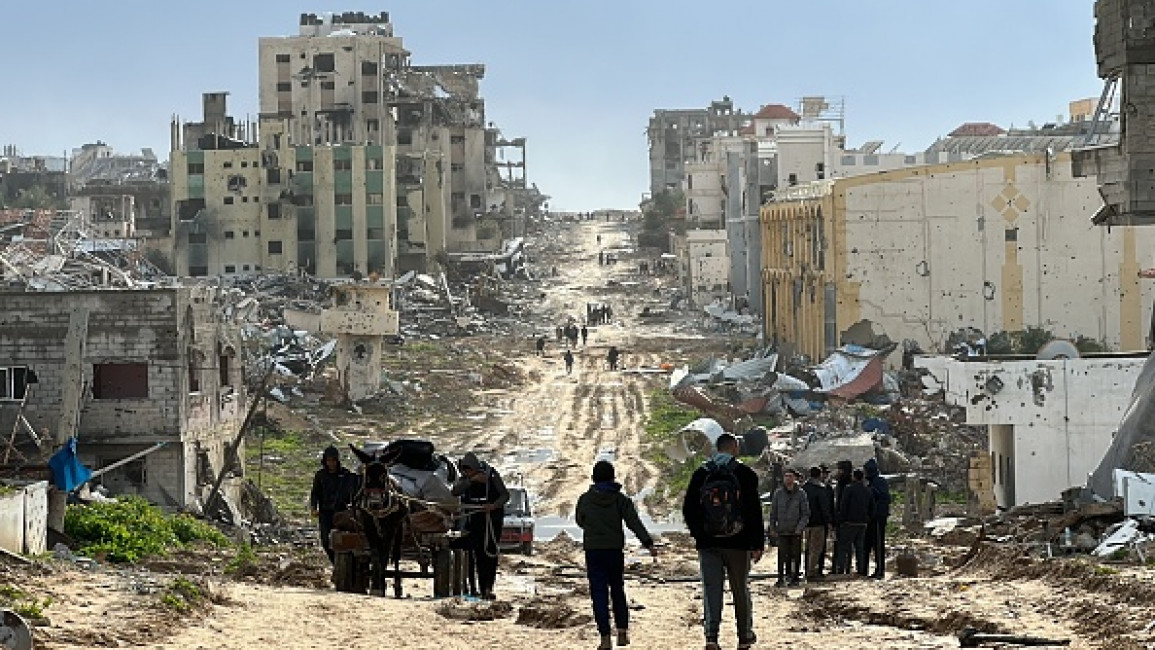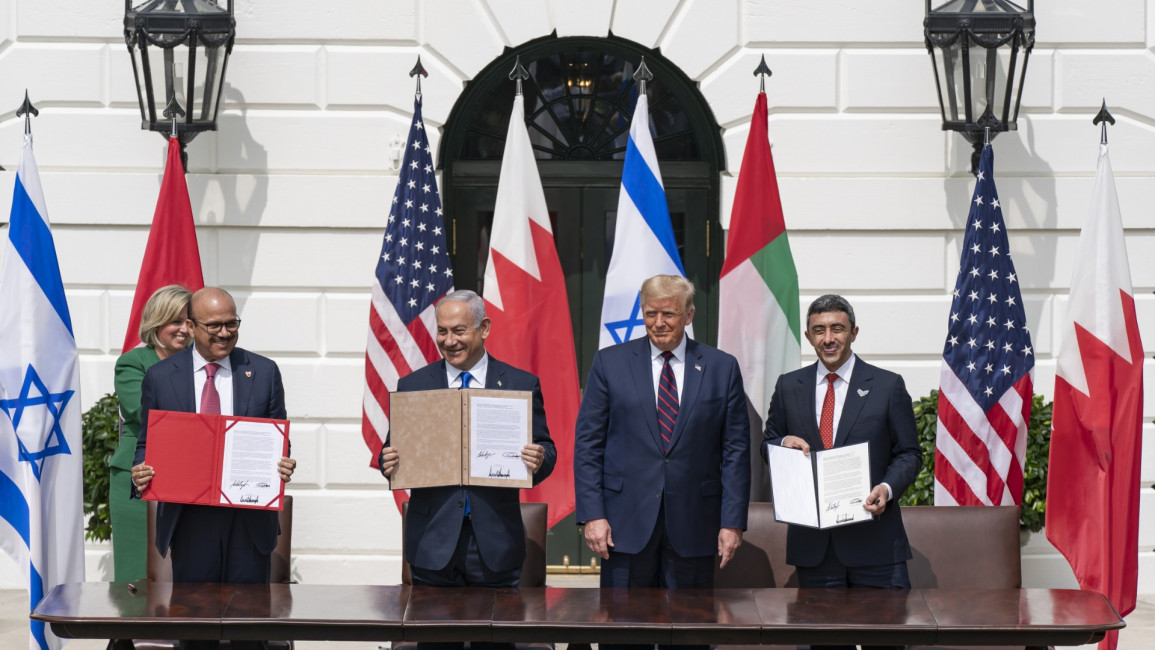
Will Arab-Israeli normalisation survive the Gaza war?

Only a few months ago many Western, Israeli, and Arab policymakers and analysts had incorrectly concluded that the Arab world had moved past the issue of Palestine.
Some commentators saw the Arab trend toward normalisation with Israel as the future. These voices were convinced that it was only a matter of time before Saudi Arabia, Oman, Tunisia, and other Arab states would enter the Abraham Accords.
The argument that the diplomatic deals signed between Arab governments - which, with the exception of Sudan, had never been confrontational actors in the Arab-Israeli conflict - and Tel Aviv in 2020 could usher in a new era of “peace” in the Middle East was widely accepted by US officials.
But 7 October changed everything. Now it is safe to assume that no new Arab states will join the Abraham Accords any time soon.
As a consequence of last year’s Hamas-led incursion into southern Israel and the Israeli war on Gaza that followed Operation al-Aqsa Flood, the Palestinian issue is at the centre of regional and global attention. In most Arab cities, there have been large Palestine solidarity protests.
"It is safe to assume that no new Arab states will join the Abraham Accords any time soon"
Because of Washington’s support for Israel’s criminal conduct in Gaza, anger in Arab societies toward the US has quickly reached levels not seen since the invasion of Iraq 21 years ago. Put simply, normalisation with Israel amid this current period would probably be nothing short of political suicide for any Arab leader.
For President Joe Biden’s administration, this new reality constitutes a major blow. Having invested massive amounts of diplomatic energy into trying to bring Saudi Arabia, Libya, and other Arab states into the Abraham Accords, the White House’s plans to convince more Arab governments to agree to bury the Palestinian issue have hit a brick wall.
However, Biden’s team seems to believe that there are still prospects for a Saudi-Israeli normalisation agreement. Reports keep on emerging about the White House working on finding a way to bring Riyadh into the normalisation camp with talk about a Palestinian “state” being established in order to make this possible.
Dr Nader Hashemi, the director of the Prince Alwaleed Center for Christian-Muslim Understanding at Georgetown University’s School of Foreign Service, expects “absolutely nothing” to come out of the Biden administration’s continued efforts to bring Riyadh into the Abraham Accords.
“What’s really shocking to me is the complete disconnect that the White House has from the realities of the Middle East and the broader Arab and Islamic worlds,” he told The New Arab.
“You still see statements and you still see indications that the Biden foreign policy team is entertaining these fantasies that they can somehow salvage this idea, which they thought would win them a Nobel Peace Prize.”
|
|
The public opinion factor
Western policymakers often fail to appreciate the extent to which Arab leaders and politicians, like their American and European counterparts, must consider domestic politics.
Although countries like Saudi Arabia have authoritarian political systems, those who rule in Riyadh and other Arab capitals can’t be indifferent to the sentiments, attitudes, and passions of the people who make up their societies.
Crown Prince and Prime Minister Mohammed bin Salman (MbS) and other Arab leaders realise how the Palestinian issue can quickly mobilise Arab citizens on the grassroots level in ways that pose direct challenges to the legitimacy of US-friendly Arab regimes.
Speaking off the record before 7 October, some Gulf Arab diplomats told The New Arab that they would expect rare street protests in Saudi Arabia if the Kingdom would normalise with Israel. Now, amid the war on Gaza, that’s even easier to imagine.
"If conditions in Gaza continue to worsen, Arab states' normalised relationships with Israel will become increasingly strained"
For many decades, Palestinian suffering has been, as Dr Hashemi put it, a “core marker of identity for Arabs and Muslims” and the pains that Arab governments are going through to avoid appearing complicit in the US-supported Israeli war on Gaza illustrate this point.
For MbS and the Saudi ruling family to move forward with plans for normalisation with a country “viewed by many people in Saudi Arabia and across the Middle East, and including around the world, as a possible genocidal state” is extremely difficult, added Dr Hashemi.
The refusal of Arab states, with the exception of Bahrain, to formally join Operation Prosperity Guardian late last year and the extent to which most Gulf Cooperation Council (GCC) members chose to distance themselves from - and in Oman’s case outright condemn - the US-UK strikes against Houthi targets in Yemen last month say much about where public opinion stands in these countries.
It is notable that even among many in the region who had previously opposed the Houthi rebel movement or didn’t have any opinion about Ansarallah, there is a view that Houthi drone and missile attacks on Israel-linked vessels in the Gulf of Aden and the southern Red Sea are justified within the context of Israel’s crimes in Gaza.
For Saudi Arabia to support such Western military action in Yemen could undermine many of the Saudi leadership’s interests, including keeping détente with Iran on track and protecting the Kingdom from Houthi reprisal attacks. But one of the other important factors explaining Riyadh’s decision to steer clear from the American-British strikes, which began on 12 January, is public opinion in Saudi Arabia.
It was notable that a pro-Israel think tank in Washington released its findings on Hamas’s standing in the eyes of the Saudi population in the post-7 October period. According to the poll, approval of the Palestinian Islamist group among Saudi citizens increased from 10 to 40 percent after the eruption of Israel’s war on Gaza in October.
“Arab governments are attempting to walk a fine line between moving forward with normalisation, and having to balance the growing anger of the so-called Arab Street, the citizens of the Middle East who are appalled by the civilian casualty count,” Dr Colin P. Clarke, the director of policy and research at the Soufan Group, told TNA.
“Hamas is now, according to some polling, more popular than ever, so the issue of what happens with Hamas once the conflict winds down is also a major issue that has not been resolved and will be difficult to deal with.”
|
|
The future of Saudi-Israeli relations
The fact that Saudi Arabia is highly unlikely to formalise diplomatic relations in the foreseeable future does not negate the fact that Riyadh and Tel Aviv’s informal relationship will probably continue to deepen. Cooperation with the Israelis in under-the-table ways will remain important to MbS and other Saudi officials.
This is particularly so within the context of Saudi Arabia’s grandiose economic diversification agenda, in which Israeli technology and innovation can play a productive role.
“Embracing the dynamic and innovative Israeli economy could indeed well serve the Kingdom's growth and diversification goals outlined in Vision 2030,” Francesco Salesio Schiavi, an Italian Middle East Expert and Analyst, told TNA.
In terms of ties between Riyadh and Tel Aviv, “clandestine relations, covert relations, coordination, and discussion will still take place as it has been taking place,” commented Dr Hashemi.
"The 2020 Arab normalisers, including Bahrain, Morocco, and the UAE, find themselves in a delicate balancing act, bridging the gap between their pro-Palestinian public sentiments and their governments' relations"
Resilience of existing normalisation accords
Today, the key question is not about which Arab state(s) might join the normalisation camp next. It is, how will the Gaza war impact the diplomatic deals that some Arab states already have with Tel Aviv? Four months after 7 October, no Arab state which previously normalised with Israel has severed diplomatic relations in response to the Gaza war.
“Overall, a combination of political and economic interests, security concerns, and strong ties with the United States shape their stance towards normalising with Tel Aviv. The 2020 Arab normalisers, including Bahrain, Morocco, and the United Arab Emirates (UAE), find themselves in a delicate balancing act, bridging the gap between their pro-Palestinian public sentiments and their governments’ relations with Tel Aviv and Washington,” Schiavi said.
In the UAE’s case, normalisation with Israel seems irreversible. A major reason why pertains to the extent to which the Abraham Accords have secured Abu Dhabi’s interests in Washington, enabling the UAE to conduct a very Russia- and China-friendly foreign policy with minimal criticism from US officials.
While governing a small and ultra-wealthy country, which is a high-tech police state, there is perhaps very little that Emirati authorities need to worry about in terms of their own population’s anger over the Abraham Accords within the context of ongoing suffering in Palestine.
But in Bahrain, Egypt, Jordan, Morocco, and Sudan, the picture differs. These governments have different dynamics to consider in terms of scrutiny of their relations with Tel Aviv. Their normalisation agreements with Israel may well weather the Gaza war.
However, if conditions in Gaza continue to worsen, these Arab states’ normalised relationships with Israel will become increasingly strained.
To be sure, a massive ethnic cleansing campaign that pushes many Palestinians in Gaza into Egypt could be a game-changer, which would open up the possibility of some Arab governments in the normalisation camp pulling out. Time will tell.
Giorgio Cafiero is the CEO of Gulf State Analytics.
Follow him on Twitter: @GiorgioCafiero



![Minnesota Tim Walz is working to court Muslim voters. [Getty]](/sites/default/files/styles/image_684x385/public/2169747529.jpeg?h=a5f2f23a&itok=b63Wif2V)






